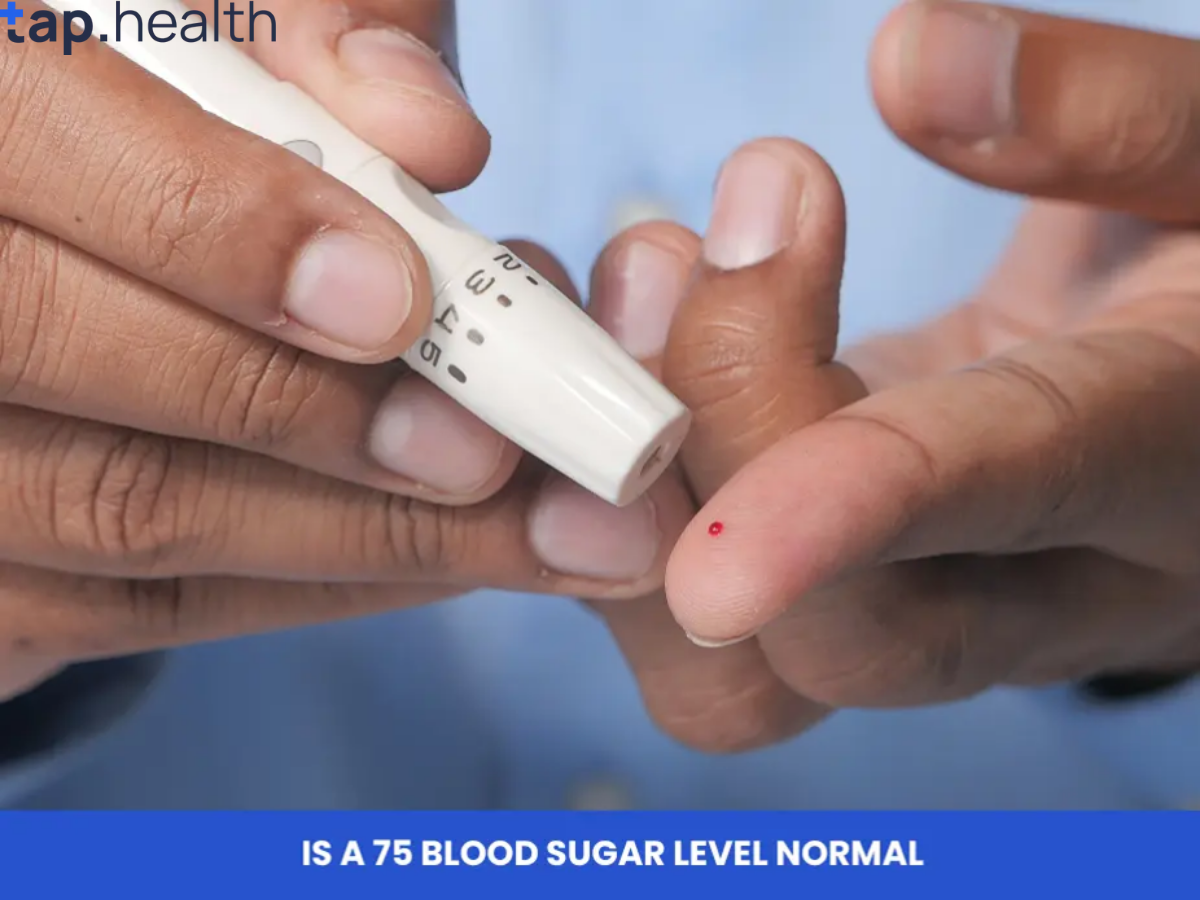When you check your blood sugar levels and find them to be around 75 mg/dL, you might wonder, “Is this normal?” Blood sugar (also known as blood glucose) is a critical measurement for your health, as it reflects how well your body is processing glucose for energy. Understanding what a 75 sugar level means, how it fits into the normal range, and the potential risks of low or high blood sugar levels is important for your overall well-being.
By the end of this article, you’ll have a comprehensive understanding of blood sugar levels, including what a 75 mg/dL reading means for your health and how to maintain it.
What is Blood Sugar?
Blood sugar, or blood glucose, is the amount of glucose (a type of sugar) present in your bloodstream. Glucose comes from the food you eat, especially carbohydrates like bread, rice, pasta, and fruits. After eating, your body breaks down carbohydrates into glucose, which enters the bloodstream to provide energy for your cells. Insulin, a hormone produced by the pancreas, helps your body regulate blood sugar levels by allowing cells to absorb glucose.
Maintaining healthy blood sugar levels is crucial because they affect how efficiently your body uses energy. When blood sugar levels are too high (hyperglycemia) or too low (hypoglycemia), it can lead to health problems, including diabetes and other serious conditions.
What Is a Normal Blood Sugar Level?
Blood sugar levels are typically measured in milligrams per deciliter (mg/dL). Normal blood sugar levels vary depending on the time of day and whether you’ve eaten recently. Here’s a general guide for healthy blood sugar ranges:
- Fasting Blood Sugar (after fasting for at least 8 hours): 70–99 mg/dL
- Postprandial Blood Sugar (2 hours after eating): Less than 140 mg/dL
- Random Blood Sugar (taken at any time of the day): Less than 200 mg/dL
These ranges are considered ideal for healthy adults without diabetes. However, for people with diabetes or other medical conditions, these targets might vary, and regular monitoring is important.
Is a 75 mg/dL Sugar Level Normal?
A fasting blood sugar level of 75 mg/dL falls within the normal range. For most people, a blood sugar level between 70 mg/dL and 99 mg/dL is considered normal for a fasting measurement. A reading of 75 mg/dL means your body is processing glucose properly and does not indicate any immediate health concerns, provided you’re in a fasted state (not having eaten for at least 8 hours).
It’s important to note that while a 75 mg/dL reading is normal, it doesn’t tell the full story of your blood sugar health. It’s just one point in time. A single reading does not provide information about your overall blood sugar trends, which are important to assess. For example, a reading after eating (post-meal) might be higher, which is completely normal. However, consistently low or high blood sugar readings may suggest an underlying issue like insulin resistance, prediabetes, or diabetes.
Causes of Low and High Blood Sugar Levels
Your blood sugar can fluctuate throughout the day based on various factors, such as diet, physical activity, stress, medications, and more. Let’s explore both ends of the spectrum: low blood sugar (hypoglycemia) and high blood sugar (hyperglycemia).
Low Blood Sugar (Hypoglycemia)
Hypoglycemia occurs when your blood sugar drops below 70 mg/dL. It’s common for people with diabetes, particularly those on insulin or other diabetes medications, but it can also happen in people without diabetes. Several factors can contribute to hypoglycemia, including:
- Skipping meals
- Intense physical activity without proper fuel
- Alcohol consumption, especially on an empty stomach
- Overmedication of insulin or diabetes drugs
- Stress or illness
Symptoms of hypoglycemia include:
- Shaking
- Dizziness or lightheadedness
- Sweating
- Rapid heartbeat
- Confusion or irritability
- Weakness or fatigue
- Blurred vision
If left untreated, severe hypoglycemia can lead to seizures, unconsciousness, and in extreme cases, death.
High Blood Sugar (Hyperglycemia)
Hyperglycemia occurs when blood sugar levels are too high, typically above 140 mg/dL after eating or over 200 mg/dL at any time of the day. This condition is common in people with diabetes but can also occur in people without the condition under certain circumstances. Factors contributing to high blood sugar include:
- Eating too many carbohydrates or sugary foods
- Lack of physical activity
- Stress and illness
- Not taking enough insulin or diabetes medications
- Certain medications, like steroids
Symptoms of hyperglycemia include:
- Increased thirst
- Frequent urination
- Blurred vision
- Fatigue
- Headaches
Prolonged hyperglycemia can cause long-term damage to organs and nerves, leading to complications such as heart disease, kidney problems, nerve damage, and vision impairment.
How to Maintain Healthy Blood Sugar Levels
Maintaining balanced blood sugar is essential for overall health. Here are some practical ways to keep your blood sugar levels stable:
- Eat a Balanced Diet
The foods you eat have a direct impact on your blood sugar. Focus on a well-balanced diet that includes:- Whole grains (like brown rice, oats, quinoa)
- Non-starchy vegetables (like leafy greens, broccoli, peppers)
- Lean proteins (chicken, fish, tofu)
- Healthy fats (avocados, nuts, seeds, olive oil) Limit foods with high sugar content, refined carbohydrates, and processed foods.
- Exercise Regularly
Physical activity helps your body use insulin more effectively and can lower blood sugar levels. Aim for at least 30 minutes of moderate-intensity exercise, such as walking, swimming, or cycling, most days of the week. - Monitor Blood Sugar Levels
Regularly checking your blood sugar levels can help you understand how your body responds to different foods, activities, and medications. It’s especially important for people with diabetes. - Manage Stress
Chronic stress can increase cortisol, a hormone that raises blood sugar. Practice relaxation techniques such as meditation, deep breathing exercises, or yoga to manage stress. - Get Enough Sleep
Poor sleep can affect insulin sensitivity and blood sugar regulation. Aim for 7–9 hours of sleep per night to help keep your blood sugar in check.
When Should You Seek Help for Blood Sugar Issues?
If you experience symptoms of high or low blood sugar regularly, it’s important to consult with a healthcare professional. Persistent hypoglycemia or hyperglycemia can lead to complications and may indicate an underlying health condition, such as diabetes. Your doctor can provide guidance on blood sugar management, conduct necessary tests, and help you create a plan to keep your blood sugar levels in a healthy range.
FAQs on Is a 75 Sugar Level Normal?
1. What should I do if my blood sugar level is 75 mg/dL but I feel symptoms of hypoglycemia?
If you feel symptoms of low blood sugar at a level of 75 mg/dL, it’s important to consume a quick source of glucose, like fruit juice or glucose tablets, to raise your blood sugar. Afterward, monitor your blood sugar to ensure it rises to a healthy level.
2. How can I prevent high blood sugar?
To prevent high blood sugar, avoid sugary foods and refined carbs, exercise regularly, manage stress, and ensure you’re taking the proper amount of diabetes medication, if applicable.
3. Is a blood sugar level of 75 mg/dL always safe?
A blood sugar level of 75 mg/dL is within the normal fasting range, but it’s important to understand the context. It’s normal if you’re fasting, but consistently low or fluctuating levels should be monitored closely.
4. Can drinking water help maintain normal blood sugar?
Yes, drinking water can help keep your blood sugar levels stable by preventing dehydration, which can raise blood sugar levels. It also helps flush out excess glucose through urine.
5. What is the best diet for managing blood sugar?
The best diet for blood sugar management includes high-fiber foods, lean proteins, healthy fats, and whole grains, while limiting sugary and processed foods. It’s also essential to eat smaller, balanced meals throughout the day.
Conclusion
A blood sugar level of 75 mg/dL is generally considered normal, especially when measured in a fasting state. However, maintaining stable blood sugar levels is crucial for long-term health, and lifestyle factors like diet, exercise, and stress management play an important role. If you have concerns about your blood sugar levels or notice unusual symptoms, consult with a healthcare provider to get personalized advice.



